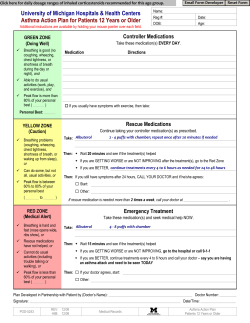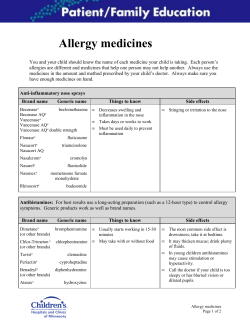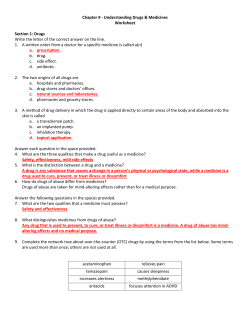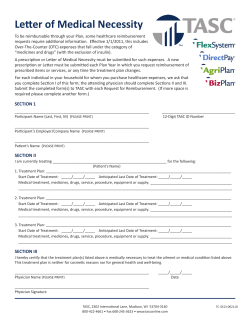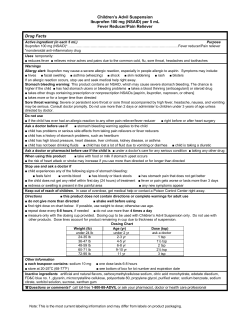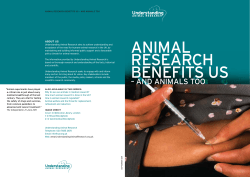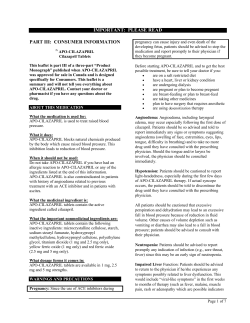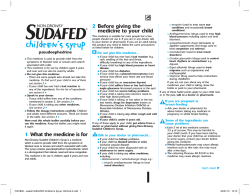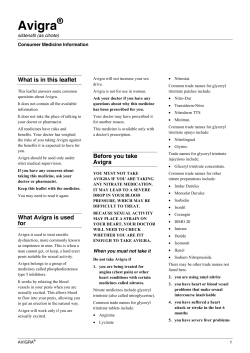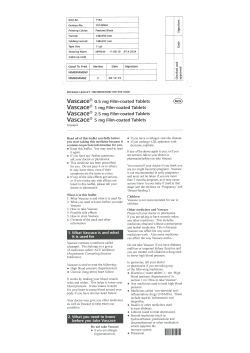
Document 68336
A Parent’s Guide to Medicine Safety As parents, we never want to see our children sick. It’s often painful for us to see our children in discomfort and it’s also difficult to comfort them when they don’t understand why they’re sick. Sickness leads to bad moods and cranky kids, which in turn leave parents frustrated and often the whole family gets stressed out when sickness invades the home. Our first response is usually to find a medicine that will cure the illness. But along with curing whatever ails your child, there are certain dangers associated with medicines, both prescription and over the counter (OTC). This guide will help you decide if medicine is even a necessary treatment, safety tips to ensure your child gets the correct dosage, natural remedies, tips for when to seek medical attention, and questions you need to ask your pediatrician. Cold Symptoms: Does Your Child Need Medicine? What do you do when your child comes home from school sniffling? Or has a nagging cough? Or has a slight fever? Do you run right to the store to get some cough and cold medicine? Many OTC medicines treat the symptoms only, rather than the illness itself, so you should determine just how uncomfortable your child is before doling out the medicine. Medicines are most effective against severe symptoms rather than minor symptoms. A slight case of the sniffles doesn’t require medicine but severe congestion can benefit from a decongestant. Use simple common sense or call your pediatrician to determine the severity of your child’s symptoms. Also take your child’s age into consideration when determining if she needs medicine. Infant OTC medicines have been deemed unreliable for treating symptoms. Children under the age of 2 risk the possibility of severe, life-threatening side effects from some OTC medicines and the FDA is currently reviewing the guidelines for toddlers. Considering that these medicines are all man-made and full of chemicals, do we really want our children ingesting medicines that might cause them harm, especially if they don’t really need it? If there’s any question about the effectiveness, why risk the possible side-effects? Treating Fever and Pain Children present with fevers when their bodies are starting to fight off some sort of infection or illness. Fever is the body’s natural way of trying to heal itself or ridding itself of the invading germs. But many parents panic and run to get aspirin or some other fever reducer. NOTE: Children under the age of 21 should avoid taking aspirin at all costs. Treating any viral infection (such as a cold, chicken pox, or flu) with aspirin can be dangerous and might lead to a life-threatening disease called Reyes syndrome. For more information about Reyes Syndrome, please visit this link: http://www.reyessyndrome.org/ Just as with the cold symptoms, there are various degrees of severity with fevers. A mild fever (up to 100.4 degrees F) can be caused by simple exercise, taking a hot bath, or wearing too many clothing layers. This is considered normal and no need to worry or break out the medicine. NOTE: Infants always require medical treatment if they have a fever over 100 degrees F. Temperatures higher than 100.4 degrees F. are considered feverish and you will sometimes see changes in your child’s demeanor. He may be sluggish, more tired, and less hungry. It’s important to watch for these symptoms so you can discuss with your doctor if the fever is a symptom of a more serious illness. Doctors generally accept treating fevers once the child shows signs of discomfort with acetaminophen (Tylenol) or ibuprofen (Advil or Motrin) products. Since ibuprofen also treats inflammation as well as pain and fever, it is stronger than acetaminophen. Accidental overdoses are common with both products so much care is necessary when giving your child either medicine. Tips for Safely Giving Your Child Medicine Here are some basic safety tips for giving your child medicine safely: 1. Read the label carefully each time – it doesn’t matter if you just opened the bottle or are using up the last dose; read the directions carefully. 2. Read what active ingredient(s) are in the medicine and let your doctor know of any allergic reactions to medication. 3. Choose the right strength to avoid accidental overdoses – an adult strength formula can be deadly for an infant or small child. 4. Use the dosing tool that comes with the medicine – a different cup or kitchen spoon might hold too much medicine. 5. Let one parent be the medicine giver – if neither parent knows the other one has already given the child his dose, this can lead to double dosing and accidental overdose. 6. Ask your doctor or pharmacist if this medicine will mix well with vitamins or other medications your child may be taking. 7. Know your child’s weight – this is the most reliable way to gauge the correct dosage for your child. 8. Know the difference between a tablespoon (Tbs) and a teaspoon (tsp) – a tablespoon holds three times as much medicine as a teaspoon which can lead to an accidental overdose. 9. Have your Poison Control Center phone number readily available and don’t be afraid to use it! Post this number by each phone and call them if you have any concerns at all. 10. Be sure the child-resistant caps are locked when closing the medicine bottles – kids love the fruity candy flavors of some medicines and you don’t want them trying to sneak more when you’re out of sight. 11. Keep all medications in a safe place out of reach of children – whether the safety cap fails to lock or you have an inventive child who can figure out how to break the cap open, you don’t want them able to get extra doses of medicine. 12. If you have family members, neighbors, or visiting guests who keep medications in their purses or suitcases, keep the purses or suitcases out of children’s reach – children will be curious about the “candy” Grandma carries in her purse. 13. Look at the expiration dates on both prescription and OTC medications – there’s some controversy about whether it’s safe to take expired medicines. Do you want to risk your child not getting the potency necessary to make her feel better? Or possibly risk it being dangerous to ingest after the expiration date? 14. Never give your child someone else’s prescription. 15. Always check the active ingredients in both prescription and OTC medications – doubling up on an active ingredient could lead to an accidental overdose. 16. Discard expired medicines carefully so little ones can’t ingest them accidentally – crush up pills and seal them in a plastic bag before discarding and never flush medicine down the toilet because it might contaminate your water supply. All Natural Remedies If your child shows signs of a mild illness, there are some all natural things you can do to ease their symptoms. For a mild cold, keep him hydrated because the increase in fluids will break up the mucus causing the congestion. Saline nasal drops and a cool mist humidifier can also help clear nasal congestion. For young children who don’t know how to blow their noses, use a bulb syringe to help clear out that mucus. For fever, use wet cloths on the forehead or under the arms to bring down the temperature. You can also place your child in a lukewarm bath; not cold enough to send them into chills but not hot enough to scald their skin. Infants who are teething can benefit from a homeopathic product such as Hyland’s Teething Tablets. These tablets dissolve on baby’s tongue and are made with all natural ingredients. For more information, visit this link: http://www.hylands.com/products/teething.php When to Seek Medical Treatment Many times we don’t want to take the time to bring our children to the doctor’s office, figuring we could save the copayment or we can treat the symptoms ourselves at home. However, there are some times when we need the medical intervention, such as: • When infants have a temperature of 100 degrees F. • When toddlers have a temperature of 102+ degrees F. • When children or adults have a temperature of 104+ degrees F. • When anyone has a fever accompanied by a rash, seizure, or the fever lasts longer than 72 hours. • If you think your child is having an allergic reaction to a medication. • If you think you may have given the wrong dosage to your child. Questions to Ask Your Doctor Having a clear understanding of the medication your doctor prescribes to your child is vital to his or her safety. Here are some important questions to ask your doctor before getting the prescription filled: • What is the name of the drug and what is it for? • Will this drug interact with any other medications or vitamins my child is taking? • How often does my child need to take this medication and for how many days or weeks? • What if I miss giving my child a dose? • How long before the drug starts working? • Are there any side effects and if so, what should I do if my child exhibits these side effects? • When can I stop giving him the medication? • Is there a generic version of this drug? Before you leave the pharmacy, check the medication and be sure it’s the right name and dosage that your doctor mentioned. If you’re unclear about anything, ask your pharmacist to explain how the medicine should be administered. If anything at all sounds different from what your doctor said, then hold off giving the medicine to your child until you get your questions answered. And if your doctor doesn’t cooperate or answer your questions to your satisfaction, then find another doctor. Medicinal Safety and Teens Safety with medicine is not reserved only for young, elementary aged children. Preteens and teenagers need just as much vigilance as do the younger children. This is the common age when kids will start to experiment and possibly cause an accidental overdose. Some common ingredients in decongestant medicines include pseudoephedrine, phenylpropanolamine, and phenylephrine. These can all affect your heart rate, blood pressure, and nervous system and severe poisoning can result in seizures and irregular heart rates. Many pharmacies now ask for identification to purchase products with these ingredients to prevent teens from buying the products and misusing them but even if you keep it in your house, a teen is still able to gain access to it. Open communication about drugs and their dangers is of paramount importance as is keeping these medicines out of the reach of teen children. Even “safe” drugs like Tylenol can be fatal or cause life-threatening side-effects if proper supervision isn’t used. In addition to communicating with your teenager, never allow him to get the dose of medicine by himself. Be the parent and take this responsibility seriously when dispensing medications. In Conclusion Protecting our children’s health is our biggest priority as parents. While it’s inevitable that they will encounter cold germs or other viral infections, how we treat them when they get sick is of utmost importance. While some people prefer to stay with all natural remedies, others may run to get some medicine to help their child’s symptoms. This is a matter of personal preference but if you choose medicine, please review and practice the safeguards in this report. The medical world has made some amazing advances with regard to treating illnesses but all too often we hear news of accidental overdoses made by careless mistakes. Your child is a precious gift and dispensing medicine should be done carefully to prevent another tragic mistake.
© Copyright 2025
